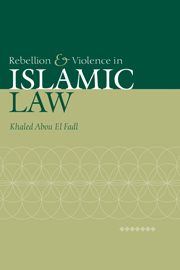Crossref Citations
This Book has been
cited by the following publications. This list is generated based on data provided by Crossref.
Rabb, Intisar A.
1920.
Doubt in Islamic Law.
2005.
World Culture.
p.
241.
Neff, Stephen C.
2005.
War and the Law of Nations.
2007.
Religion and Violence in South Asia.
p.
88.
Williams, Jack F.
2008.
Wiley Handbook of Science and Technology for Homeland Security.
p.
1.
Lange, Christian
2010.
Crime and Punishment in Islamic History (Early to Middle Period): A Framework for Analysis.
Religion Compass,
Vol. 4,
Issue. 11,
p.
694.
Engeland-Nourai, Anicée
2010.
Jihad and its Challenges to International and Domestic Law.
p.
139.
Kelsay, John
2011.
Encyclopedia of Medieval Philosophy.
p.
1381.
Ahmad, Ahmad Atif
2012.
The Fatigue of the Shari'a.
p.
23.
Mandalà, Giuseppe
2012.
Una nueva fuente para la historia de la Sicilia islámica: un pasaje de al-Muqtabis V de Ibn Hayyān sobre la revuelta de Aḥmad b. Qarhab (300- 304/913-916).
Al-Qanṭara,
Vol. 33,
Issue. 2,
p.
343.
Grafton, David D.
2012.
The Arabshaykh: authority in Christian and Muslim communities, and questions of social–political reform.
Islam and Christian–Muslim Relations,
Vol. 23,
Issue. 1,
p.
19.
HEGGHAMMER, THOMAS
2013.
Should I Stay or Should I Go? Explaining Variation in Western Jihadists' Choice between Domestic and Foreign Fighting.
American Political Science Review,
Vol. 107,
Issue. 1,
p.
1.
Shabana, Ayman
2013.
Religious and cultural legitimacy of bioethics: lessons from Islamic bioethics.
Medicine, Health Care and Philosophy,
Vol. 16,
Issue. 4,
p.
671.
2013.
The Shari'a and Islamic Criminal Justice in Time of War and Peace.
p.
118.
Abou El Fadl, Khaled
2014.
WHEN HAPPINESS FAILS: AN ISLAMIC PERSPECTIVE.
Journal of Law and Religion,
Vol. 29,
Issue. 1,
p.
109.
Osman, Amr
2015.
Past Contradictions, Contemporary Dilemmas: Egypt's 2013 Coup and Early Islamic History.
Digest of Middle East Studies,
Vol. 24,
Issue. 2,
p.
303.
Bazzano, Elliott A.
2015.
Ibn Taymiyya, Radical Polymath, Part 2: Intellectual Contributions.
Religion Compass,
Vol. 9,
Issue. 4,
p.
117.
Bazzano, Elliott A.
2015.
Ibn Taymiyya, Radical Polymath, Part I: Scholarly Perceptions.
Religion Compass,
Vol. 9,
Issue. 4,
p.
100.
Agrama, Hussein Ali
2015.
A Companion to the Anthropology of the Middle East.
p.
361.
Barzegar, Abbas
2015.
“Adhering to the Community” (Luzūm al-Jamāʿa): Continuities between late Umayyad Political Discourse and “Proto-Sunni” Identity.
Review of Middle East Studies,
Vol. 49,
Issue. 2,
p.
140.



